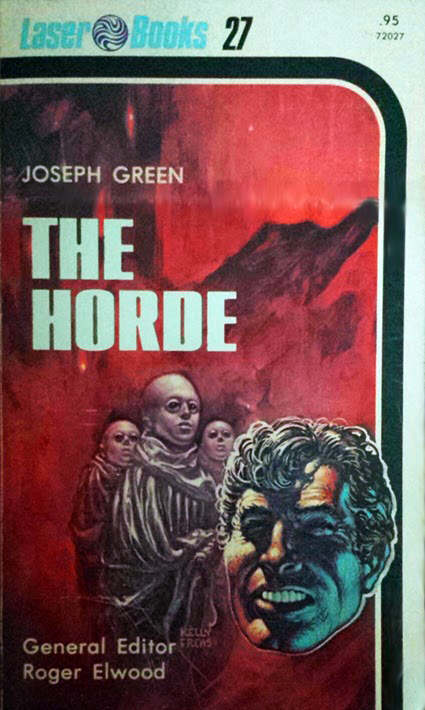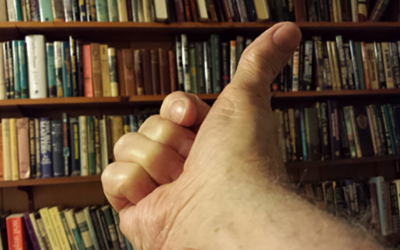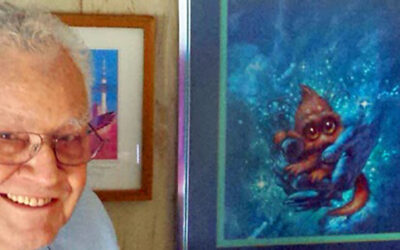(continued from Part I)
I MET ROGER ELWOOD a couple of times at Cons, and in person he was a perfectly congenial chap. Other writers have spoken of difficulties with Elwood, some regarding story content and a few of payment problems. I encountered neither, though of course, as with all publishers, I had to accept on faith that the account statements were accurate.
When Harlequin authorized the new SF line I received a call from Elwood wanting a novel, and soon. I had one in work and agreed to send it to him, via my agent, when finished. I had started this, my fifth SF novel, as a work of some ambition. I wanted to explore, in fictional form, the consequences of having a very strong sex drive, one built into each individual and an important factor in any species chances of long-term survival. My approach was to contrast homo sapiens with an equally intelligent species that reproduced without sex, hence had no such drives or resultant passions (and/or pathologies and psychological problems traceable to the sex drive). Such a species obviously must have drives that provide reproduction and a desire for individual survival, or they wouldn’t’ have lasted long enough to become intelligent.
Of course the novel had to be structured as an adventure story, to keep readers interested enough to turn pages. But as a part-time free-lancer, writing at night and on weekends, it took me a long time to produce a novel. This one, as planned, would take at least a year. And Elwood wanted it like now. So I changed my approach, and wrote the novel as a straight adventure story. I preserved the sexless intelligent aliens, but did not explore any of the ancillary deeper questions.
The resultant novel was a perfectly decent SF adventure story. The one I had planned could, I believe, have been an outstanding SF novel. Hopefully, a work at least somewhat comparable as a trailblazer to Le Guins’ The Left Hand Of Darkness, or Phil Farmer’s The Lovers and Night Of Light. Now that novel will never be written, at least not by me. (And it makes me wonder how many other novels got ‘dumbed down’ to fulfill Elwood’s needs. He wanted 60,000 words maximum; not that much room to explore complex themes without becoming didactic.)
Roger Elwood served only as acquisitions editor for the new line; Harlequin staffers did the actual editing. The Laser Books were designed to look alike, with great covers by Kelly Freas usually featuring an inset profile of a major character. (My novel The Horde, Laser Book 27, has a head view of me, somewhat glorified [Kelly was painting from memory], as the major human character.)
I ran into Ray Nelson, author of Laser Book 13, Blake’s Progress, at a Con a few months after my novel appeared. Ray mentioned that his book, mine, and one other had earned good reviews. But I never saw these.
By the time the series ended (57 published, at a rate of three a month) the overall line had not fared well with the critics. Despite this, I was told later that Harlequin made a profit, but a much lower one than from their romances. So they killed Laser Books.
Several authors did more than one Laser novel, but I didn’t. I had been too traumatized, by the worst experience in my life as a writer, to even consider it. When the editor in charge of the Laser line at Harlequin received my mss., he turned it over to his assistant to copy-edit. She started rewriting instead; and let’s just say she knew nothing of science and little of fiction writing. Never before or since have I seen such butchery. About three-quarters through she realized she had gotten completely lost; starting new plotlines and then dropping them, cutting sections vitally needed for the main story, etc. So she stopped copy-editing at that point and just sent me the marked- up mss.
To say that I blew my top would be to understate my rage. I wrote a letter to the head editor at Harlequin that really should have been printed on asbestos. I demanded that my novel be restored to its original version, that the editors be reprimanded, etc. And it was! All her copy-edits were removed, and the novel printed just as I had written it.
Not long after this contretemps, I met the Laser editor and his assistant (a young woman so lovely it took will power not to drop chin and just gape) when they attended a writers’ workshop in Tampa, where I was a guest lecturer. Despite my letter (or perhaps because of it), when meeting me in person she was very nice, as was the male editor. (Apologies, hope feelings not hurt, etc.) But next year at that same workshop they were missing, and their boss to whom I had complained came instead. He told me Harlequin had fired both. (I doubt the young lovely chose me alone for slaughter; other writers must have complained as well. But the boss editor said my letter had been the tipping point.) So I was instrumental, for the first and only time in my life, in getting an editor (plus lovely assistant) fired. She, I am sure, had no trouble finding another job.
I note that Harlequin is trying again, with their Carina Press imprint publishing both science fiction and fantasy as e-books. I wish them luck. Harlequin/Laser had at least one virtue, in addition to the great Kelly Freas covers. They paid promptly, and well.
Image credit: Greenhouse Scribes © 2014





0 Comments